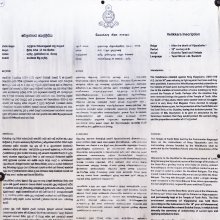Seka, Sekā, Sheka: 23 definitions
Introduction:
Seka means something in Buddhism, Pali, Hinduism, Sanskrit, the history of ancient India, Marathi, biology. If you want to know the exact meaning, history, etymology or English translation of this term then check out the descriptions on this page. Add your comment or reference to a book if you want to contribute to this summary article.
Seka has 23 English definitions available.
Images (photo gallery)
Languages of India and abroad
Sanskrit dictionary
[Deutsch Wörterbuch]
Source: Cologne Digital Sanskrit Dictionaries: Böhtlingk and Roth Grosses Petersburger WörterbuchSeka (सेक):—(von 1. sic) m.
1) Guss, Erguss (z. B. des Samens): gorna seke [Ṛgveda 1, 181, 8.] pi.ā duhi.uḥ sekamṛñjan [3, 31, 1.] [Yāska’s Nirukta 3, 5.] [Ṛgveda 4, 16, 3.] krivi.na seka.ā gamat [8, 76, 1.] retasaḥ [Manu’s Gesetzbuch 11, 120.] —
2) Begiessung, Besprengung [Hemacandra’s Abhidhānacintāmaṇi 837.] [Manu’s Gesetzbuch 5, 124.] [Yājñavalkya’s Gesetzbuch 1, 188.] [Raghuvaṃśa 1, 51. 19, 10.] [Spr. (II) 387.] dagdhānāmabhitaptodakaiḥ [3116.] manaḥprasādapayasā niṣpannasekakriyaḥ (dānamahīruhaḥ) [6710.] vanaspateḥ [Varāhamihira’s Bṛhajjātaka S. 55,18.] [Rājataraṅgiṇī.5,111.] [Mārkāṇḍeyapurāṇa 35,16.] [Bhāgavatapurāṇa 11,11,39.] [Oxforder Handschriften 103,a,10.] in der Heilkunde so v. a. Tropfoder Spritzbad, Waschung (gewöhnlicher pariṣeka): śīta [Suśruta 1, 37, 19. 2, 11, 19. 138, 9.] [Śārṅgadhara SAṂH. 3, 13, 1. 2. 4. 5.] —
3) am Ende eines comp. Erguss von und Begiessung —, Besprengung mit: retaḥsekaḥ svayonīṣu [Manu’s Gesetzbuch 11, 58.] navajalakaṇa [Ṛtusaṃhāra 2, 26.] sāñjanabāṣpa [Raghuvaṃśa 6, 55.] hima [8, 45.] madavāri [16, 30.] vṛṣṭi [17, 16.] [Śākuntala 152, v. l.] madajala [Kirātārjunīya 5, 26.] amṛta [Spr. (II) 5991.] [Varāhamihira’s Bṛhajjātaka S. 55, 16.] [Kathāsaritsāgara 29, 172.] ayaṃ tvamṛtaseko sya tvanmantro rājyaśākhinaḥ [33, 163. 117, 53. 121, 238.] kanakakalaśa Guss oder Begiessung aus [Spr. (II) 433.] —
4) pl. Nomen proprium eines Volkes, neben apara [Mahābhārata 2, 1113.] — Vgl. suṣeka .
Sanskrit, also spelled संस्कृतम् (saṃskṛtam), is an ancient language of India commonly seen as the grandmother of the Indo-European language family (even English!). Closely allied with Prakrit and Pali, Sanskrit is more exhaustive in both grammar and terms and has the most extensive collection of literature in the world, greatly surpassing its sister-languages Greek and Latin.
See also (Relevant definitions)
Starts with (+43): Ceka-racacekaram, Cekaccoti, Cekam, Cekan, Cekanmokini, Cekantai, Cekanti, Cekantimuttirai, Cekantiyati, Cekantiyilvai, Cekarakkaran, Cekaran, Cekarancey, Cekarattar, Cekarkuru, Cekatalam, Cekatam, Cekatampikai, Cekati, Cekatkuru.
Ends with (+94): Abhisheka, Abhyutseka, Acaryabhisheka, Adaguseka, Ajyabhisheka, Ambuseka, Amritabhisheka, Amritaseka, Anisheka, Annabhisheka, Anusheka, Anutseka, Aparaseka, Aseka, Atyutseka, Avaseka, Avyaseka, Biseka, Candrabhisheka, Caturthabhisheka.
Full-text (+56): Sekapatra, Sea, Retahseka, Sekamdharapuri, Prasekam, Aseka, Secanaka, Anusheka, Abhisheka, Nisheka, Avaseka, Praseka, Secana, Sekima, Shaikya, Nishekasvara, Nidha, Abhishekabhumipratilambha, Nishekaprakara, Nishekavicara.
Relevant text
Search found 16 books and stories containing Seka, Sekā, Sheka, Śēka, Śeka, Ṣeka, Sēka; (plurals include: Sekas, Sekās, Shekas, Śēkas, Śekas, Ṣekas, Sēkas). You can also click to the full overview containing English textual excerpts. Below are direct links for the most relevant articles:
Rig Veda (translation and commentary) (by H. H. Wilson)
Manusmriti with the Commentary of Medhatithi (by Ganganatha Jha)
Verse 11.120 < [Section XII - Expiation for the Immoral Religious Student (avakīrṇa)]
Sushruta Samhita, Volume 6: Uttara-tantra (by Kaviraj Kunja Lal Bhishagratna)
Chapter XVIII - Preparations and medicinal measures for ocular affections in general < [Canto I - Shalakya-tantra (ears, eyes, nose, mouth and throat)]
Chapter XII - Treatment of Raktaja Ophthalmia < [Canto I - Shalakya-tantra (ears, eyes, nose, mouth and throat)]
Chapter XLVII - Symptoms and Treatment of Alcoholism (Panatyaya) < [Canto III - Kaya-chikitsa-tantra (internal medicine)]
Puranic encyclopaedia (by Vettam Mani)
List of Mahabharata people and places (by Laxman Burdak)
Sushruta Samhita, volume 4: Cikitsasthana (by Kaviraj Kunja Lal Bhishagratna)
Related products


